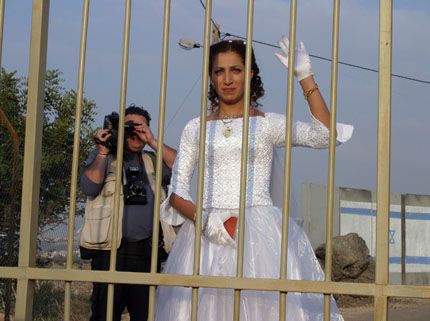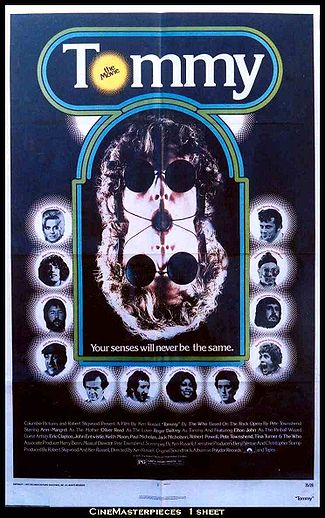
With The Syrian Bride, Israeli director Eran Riklis sturdies his reputation as a filmmaker who can tell a local story with universal appeal -- Israeli audiences included. It's the sort of breakthrough that resonates with the self-proclaimed maker of "obscure Chinese or European films" who spent part of his boyhood in the U.S. and loves American movies.
Says Rilis, "In terms of genre, The Syrian Bride is a little bit of a Western, a little bit of a family drama and a wedding drama...It has everything in it." Everything including Arabic dialogue. "Contrary to expectations, he notes, his Middle Eastern tale "has done extremely well in the Israeli box office."
This wasn't always the case. Riklis's 1991 film, Cup Final, saw success around the world, but kept war-weary Israelis away in droves. Arguably, its portrait of Arabs and Israelis caught in senseless conflict was more on-the-nose than Israeli moviegoers could stomach. "When you try to deal with (Israeli-Palestinian strife) you are competing with the news and it's too close to home," observes the 51-year old media veteran.
The Syrian Bride, co-written with former Palestinian journalist Suha Arraf, visits similarly embattled terrain, but does so elliptically, though the template of the every family. "No one wants to be lectured about Arabs and Israelis," Riklis says. "Everywhere I've gone with the film people tell me the characters reminded them of their father or someone they knew or how it was in their own family."
The ring of domestic truth is no coincidence. Riklis drew inspiration from his 1999 documentary, Borders, which was also set in northern Israel. "I was actually witnessing the same events that happen here in the sense that the bride never got married that day because of bureaucracy," he explains.
In the bittersweet drama of The Syrian Bride, a wedding between a Druze woman from the Israeli-occupied Golan Heights and a Syrian TV comedian may or may not take place. Will Mona, the titular bride, succeed in crossing the Syrian frontier? Having entered the point-of-no-return beyond the Israeli border, she faces limbo, incarceration or automatic fire.
The audience will surely divide into optimists who see Mona's gutsy dash for her intended as hope for a happy ending beyond Middle Eastern politics and tradition, and pessimists who'll take past and present as prologue and only expect doom.
Intriguingly, Mona isn't the protagonist of this storied and affecting film -- older sister Amal is. (Amal means "hope" in Arabic; change a vowel and it's "action.") Luminously played by Hiam Abbass, Amal is the engine of change who emboldens Mona to take matters into her own hands. If all goes well with Amal's campaign to bust conventions, she'll soon be enrolled in Haifa University with her conservative husband's blessings and their other daughter will be free to see her non-Druze suitor.
Having already nudged her own father (veteran actor Makram J. Khoury, real life father of Clara Khoury, who plays Mona), to embrace his exiled son and Russian wife, Amal gives us reason to think she may sledge a chink in the mold after all.
For Riklis, the movie's "Kafkaesque reflection on Middle East chaos" is both a slice of reality and an occasion to mention "opsimism," a mix of optimism and pessimism he deems handy in braving the region's zigs and zags.
As Riklis has it, "The underlying current of the film is really about not being able to educate anyone to say that this is right or this is wrong; it's about making decisions. In certain situations, people have to...take control of their own life against all odds -- against the wishes of their government and traditions -- because that's the only way to move ahead. If you look at Ariel Sharon, he did something which went against all odds. What will happen next, nobody knows."
He adds, "As an Israeli and as a filmmaker, I really believe in films that are personal and dramatic, but set against socio-political backgrounds. You can't ignore what's going on around you."
Far from the soapbox, humor helps Riklis establish the shared humanity of individuals caught in absurd predicaments across cultural and national divides. In a particularly wry one-two punch, empty desks in both Jerusalem and Damascus hint that the region's citizens may have more in common than they may imagine. From an article in the Israeli daily Ha'Aretz, Riklis learned that an influential columnist for the Egyptian daily Al-Ahram plugged The Syrian Bride as a must-see. Riklis notes, "This film opened my eyes to what can be different."
The Syrian Bride rides a wave of Israeli films that are winning hearts, minds and revenue streams in international markets previously tough to crack for the country's filmmakers. Gidi Dar's Ushpizin, Joseph Cedar's Campfire and Eytan Fox's Walk on Water are among other Sabra titles to snag U.S. distribution in recent months.
Though each film plies its distinct vision, what justifies trendspotters who detect a common thread and has fans going is that allegory is in and literal didacticism is out in the era of Intifada II. The drama is the message, and it translates beautifully in all languages.
It also hasn't hurt that the Israeli Film Fund has plumped its coffers in recent years. Still, no one can accuse Israeli producers of being spoiled. The 10 or so most prolific players regularly scramble to supplement the Fund's typically $500,000 - $900,000 disbursements to round out their budgets by a remaining third. Hence The Syrian Bride's film's German and French dowry, in addition to its Israeli Film Fund shekels.
For all the excitement rollicking the Israeli film industry, Riklis laments that his colleagues have yet to come together in a collaborative movement similar to the U.S. directors of the 70s. He says, "Like the characters in The Syrian Bride, we need a little revolution in mentality." According to Riklis, who began his career 30 years ago directing commercials, the biggest barrier to overcome is jealous competition amid scarcity.
Increasingly, the Tel Aviv resident identifies himself as a European director. "I don't feel any different from a director who wakes up in Norway and says, 'Okay, I gotta make a film now. There's not enough money in Norway, so I have to look for money in Spain, Italy or France and I can do it.' Obviously, for Israelis, it has been more difficult because we...can't just hop on a train. Politically speaking, it was always difficult. But I think it's changing."
For his next projects--a Palestinian-Israeli dark comedy called The Lemon Tree and a political thriller set in Bolivia, CochabamBa--he'll continue to see the world as his oyster. With more beauts like The Syrian Bride to look forward to, here's hoping it'll cough up the pearls.
In the interim, Riklis is happy to have a cross-cultural film that is "the flavor of the year for the Israeli Foreign Ministry." To top that, he'd have to vault some borders himself. "My biggest dream is the have an opening night in Damascus," he grins.






























